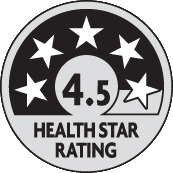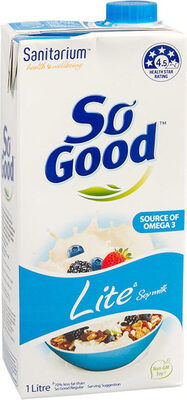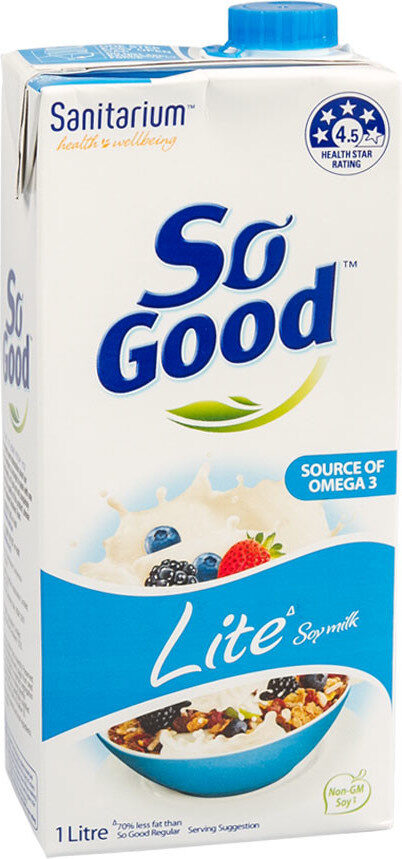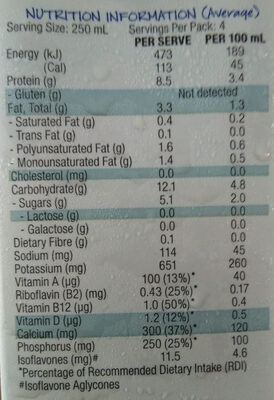Help us make food transparency the norm!
As a non-profit organization, we depend on your donations to continue informing consumers around the world about what they eat.
The food revolution starts with you!
Soyamilk, Lite - So Good - 1 l
Soyamilk, Lite - So Good - 1 l
This product page is not complete. You can help to complete it by editing it and adding more data from the photos we have, or by taking more photos using the app for Android or iPhone/iPad. Thank you!
×
Barcode: 9300652511918 (EAN / EAN-13)
Quantity: 1 l
Packaging: Tetra Brik
Brands: So Good, Sanitarium
Categories: Beverages and beverages preparations, Plant-based foods and beverages, Beverages, Plant-based foods, Legumes and their products, Dairy substitutes, Milk substitutes, Plant-based beverages, Plant-based milk alternatives, Legume-based drinks, Soy-based drinks
Labels, certifications, awards:
Source of proteins, Health Star Rating, Health Star Rating 4.5, Health Star Rating 5, High in calcium, High proteins

Origin of ingredients: Australia
Manufacturing or processing places: Australia
Stores: Coles, Woolworths
Countries where sold: Australia, France, New Zealand
Matching with your preferences
Health
Ingredients
-
23 ingredients
Filtered water, soy protein 3.5%, corn maltodextrin, cane sugar, vegetable oils (sunflower, canola), acidity regulators (332, 450), minerals (calcium, phosphorus, magnesium), antioxidant (ascorbic acid), vitamins (B12, A, B2, D2, B1), natural flavour.Allergens: Soybeans
Food processing
-
Ultra processed foods
Elements that indicate the product is in the 4 - Ultra processed food and drink products group:
- Additive: E450 - Diphosphates
- Ingredient: Flavouring
- Ingredient: Maltodextrin
Food products are classified into 4 groups according to their degree of processing:
- Unprocessed or minimally processed foods
- Processed culinary ingredients
- Processed foods
- Ultra processed foods
The determination of the group is based on the category of the product and on the ingredients it contains.
Additives
-
E332 - Potassium citrates
Potassium citrate: Potassium citrate -also known as tripotassium citrate- is a potassium salt of citric acid with the molecular formula K3C6H5O7. It is a white, hygroscopic crystalline powder. It is odorless with a saline taste. It contains 38.28% potassium by mass. In the monohydrate form it is highly hygroscopic and deliquescent. As a food additive, potassium citrate is used to regulate acidity and is known as E number E332. Medicinally, it may be used to control kidney stones derived from either uric acid or cystine.Source: Wikipedia
-
E450 - Diphosphates
Diphosphates (E450) are food additives often utilized to modify the texture of products, acting as leavening agents in baking and preventing the coagulation of canned food.
These salts can stabilize whipped cream and are also found in powdered products to maintain their flow properties. They are commonly present in baked goods, processed meats, and soft drinks.
Derived from phosphoric acid, they're part of our daily phosphate intake, which often surpasses recommended levels due to the prevalence of phosphates in processed foods and drinks.
Excessive phosphate consumption is linked to health issues, such as impaired kidney function and weakened bone health. Though diphosphates are generally regarded as safe when consumed within established acceptable daily intakes, it's imperative to monitor overall phosphate consumption to maintain optimal health.
Ingredients analysis
-
Palm oil free
No ingredients containing palm oil detected
Unrecognized ingredients: 332, 450, PhosphorusSome ingredients could not be recognized.
We need your help!
You can help us recognize more ingredients and better analyze the list of ingredients for this product and others:
- Edit this product page to correct spelling mistakes in the ingredients list, and/or to remove ingredients in other languages and sentences that are not related to the ingredients.
- Add new entries, synonyms or translations to our multilingual lists of ingredients, ingredient processing methods, and labels.
If you would like to help, join the #ingredients channel on our Slack discussion space and/or learn about ingredients analysis on our wiki. Thank you!
-
Vegan status unknown
Unrecognized ingredients: 332, 450, Calcium, Phosphorus, Magnesium, Vitamin b12, ThiaminSome ingredients could not be recognized.
We need your help!
You can help us recognize more ingredients and better analyze the list of ingredients for this product and others:
- Edit this product page to correct spelling mistakes in the ingredients list, and/or to remove ingredients in other languages and sentences that are not related to the ingredients.
- Add new entries, synonyms or translations to our multilingual lists of ingredients, ingredient processing methods, and labels.
If you would like to help, join the #ingredients channel on our Slack discussion space and/or learn about ingredients analysis on our wiki. Thank you!
-
Vegetarian status unknown
Unrecognized ingredients: 332, 450, Calcium, Phosphorus, Magnesium, Vitamin b12, ThiaminSome ingredients could not be recognized.
We need your help!
You can help us recognize more ingredients and better analyze the list of ingredients for this product and others:
- Edit this product page to correct spelling mistakes in the ingredients list, and/or to remove ingredients in other languages and sentences that are not related to the ingredients.
- Add new entries, synonyms or translations to our multilingual lists of ingredients, ingredient processing methods, and labels.
If you would like to help, join the #ingredients channel on our Slack discussion space and/or learn about ingredients analysis on our wiki. Thank you!
-
Details of the analysis of the ingredients
We need your help!
Some ingredients could not be recognized.
We need your help!
You can help us recognize more ingredients and better analyze the list of ingredients for this product and others:
- Edit this product page to correct spelling mistakes in the ingredients list, and/or to remove ingredients in other languages and sentences that are not related to the ingredients.
- Add new entries, synonyms or translations to our multilingual lists of ingredients, ingredient processing methods, and labels.
If you would like to help, join the #ingredients channel on our Slack discussion space and/or learn about ingredients analysis on our wiki. Thank you!
en: Filtered water, _soy_ protein 3.5%, corn maltodextrin, cane sugar, vegetable oils (sunflower, canola), acidity regulators (332, 450), minerals (calcium, phosphorus, magnesium), antioxidant (ascorbic acid), vitamins, vitamin B12, vitamin A, vitamin B2, vitamin D2, vitamin B1, natural flavour- Filtered water -> en:filtered-water - vegan: yes - vegetarian: yes - ciqual_food_code: 18066 - percent_min: 69 - percent_max: 96.5
- _soy_ protein -> en:soy-protein - vegan: yes - vegetarian: yes - ciqual_food_code: 20591 - percent_min: 3.5 - percent: 3.5 - percent_max: 3.5
- corn maltodextrin -> en:corn-maltodextrin - vegan: yes - vegetarian: yes - percent_min: 0 - percent_max: 3.5
- cane sugar -> en:cane-sugar - vegan: yes - vegetarian: yes - ciqual_proxy_food_code: 31016 - percent_min: 0 - percent_max: 2
- vegetable oils -> en:vegetable-oil - vegan: yes - vegetarian: yes - from_palm_oil: maybe - percent_min: 0 - percent_max: 2
- sunflower -> en:sunflower - vegan: yes - vegetarian: yes - percent_min: 0 - percent_max: 2
- canola -> en:canola - vegan: yes - vegetarian: yes - percent_min: 0 - percent_max: 1
- acidity regulators -> en:acidity-regulator - percent_min: 0 - percent_max: 2
- 332 -> en:332 - percent_min: 0 - percent_max: 2
- 450 -> en:450 - percent_min: 0 - percent_max: 1
- minerals -> en:minerals - percent_min: 0 - percent_max: 2
- calcium -> en:calcium - percent_min: 0 - percent_max: 2
- phosphorus -> en:phosphorus - percent_min: 0 - percent_max: 1
- magnesium -> en:magnesium - percent_min: 0 - percent_max: 0.666666666666667
- antioxidant -> en:antioxidant - percent_min: 0 - percent_max: 2
- ascorbic acid -> en:e300 - vegan: yes - vegetarian: yes - percent_min: 0 - percent_max: 2
- vitamins -> en:vitamins - vegan: yes - vegetarian: yes - percent_min: 0 - percent_max: 2
- vitamin B12 -> en:vitamin-b12 - percent_min: 0 - percent_max: 2
- vitamin A -> en:vitamin-a - vegan: yes - vegetarian: yes - percent_min: 0 - percent_max: 2
- vitamin B2 -> en:e101 - vegan: maybe - vegetarian: yes - percent_min: 0 - percent_max: 2
- vitamin D2 -> en:ergocalciferol - vegan: yes - vegetarian: yes - percent_min: 0 - percent_max: 2
- vitamin B1 -> en:thiamin - percent_min: 0 - percent_max: 2
- natural flavour -> en:natural-flavouring - vegan: maybe - vegetarian: maybe - percent_min: 0 - percent_max: 2
Nutrition
-
Very good nutritional quality
⚠ ️Warning: the amount of fruits, vegetables and nuts is not specified on the label, it was estimated from the list of ingredients: 0This product is not considered a beverage for the calculation of the Nutri-Score.
Positive points: 2
- Proteins: 2 / 5 (value: 3.4, rounded value: 3.4)
- Fiber: 0 / 5 (value: 0, rounded value: 0)
- Fruits, vegetables, nuts, and colza/walnut/olive oils: 0 / 5 (value: 0.5, rounded value: 0.5)
Negative points: 0
- Energy: 0 / 10 (value: 189, rounded value: 189)
- Sugars: 0 / 10 (value: 2, rounded value: 2)
- Saturated fat: 0 / 10 (value: 0.2, rounded value: 0.2)
- Sodium: 0 / 10 (value: 18, rounded value: 18)
The points for proteins are counted because the negative points are less than 11.
Nutritional score: (0 - 2)
Nutri-Score:
-
Nutrient levels
-
Fat in low quantity (1.3%)
What you need to know- A high consumption of fat, especially saturated fats, can raise cholesterol, which increases the risk of heart diseases.
Recommendation: Limit the consumption of fat and saturated fat- Choose products with lower fat and saturated fat content.
-
Saturated fat in low quantity (0.2%)
What you need to know- A high consumption of fat, especially saturated fats, can raise cholesterol, which increases the risk of heart diseases.
Recommendation: Limit the consumption of fat and saturated fat- Choose products with lower fat and saturated fat content.
-
Sugars in low quantity (2%)
What you need to know- A high consumption of sugar can cause weight gain and tooth decay. It also augments the risk of type 2 diabetes and cardio-vascular diseases.
Recommendation: Limit the consumption of sugar and sugary drinks- Sugary drinks (such as sodas, fruit beverages, and fruit juices and nectars) should be limited as much as possible (no more than 1 glass a day).
- Choose products with lower sugar content and reduce the consumption of products with added sugars.
-
Salt in low quantity (0.045%)
What you need to know- A high consumption of salt (or sodium) can cause raised blood pressure, which can increase the risk of heart disease and stroke.
- Many people who have high blood pressure do not know it, as there are often no symptoms.
- Most people consume too much salt (on average 9 to 12 grams per day), around twice the recommended maximum level of intake.
Recommendation: Limit the consumption of salt and salted food- Reduce the quantity of salt used when cooking, and don't salt again at the table.
- Limit the consumption of salty snacks and choose products with lower salt content.
-
-
Nutrition facts
Nutrition facts As sold
for 100 g / 100 mlAs sold
per serving (250g)Compared to: Soy-based drinks Energy 189 kj
(45 kcal)472 kj
(112 kcal)-4% Fat 1.3 g 3.25 g -30% Saturated fat 0.2 g 0.5 g -40% Monounsaturated fat 0.5 g 1.25 g +28% Polyunsaturated fat 0.6 g 1.5 g -33% Cholesterol 0 mg 0 mg Carbohydrates 4.8 g 12 g +14% Sugars 2 g 5 g -40% Fiber 0 g 0 g -100% Proteins 3.4 g 8.5 g +9% Salt 0.045 g 0.113 g -53% Vitamin A 40 µg 100 µg -55% Vitamin D 0.5 µg 1.25 µg -67% Vitamin B2 (Riboflavin) 0.17 mg 0.425 mg -19% Vitamin B12 (cobalamin) 0.4 µg 1 µg -75% Potassium 260 mg 650 mg +50% Calcium 120 mg 300 mg +3% Phosphorus 100 mg 250 mg +18% Fruits‚ vegetables‚ nuts and rapeseed‚ walnut and olive oils (estimate from ingredients list analysis) 0.5 % 0.5 %
Environment
-
Eco-Score A - Very low environmental impact
⚠ ️Select a country in order to include the full impact of transportation.The Eco-Score is an experimental score that summarizes the environmental impacts of food products.→ The Eco-Score was initially developped for France and it is being extended to other European countries. The Eco-Score formula is subject to change as it is regularly improved to make it more precise and better suited to each country.Life cycle analysis
-
Average impact of products of the same category: A (Score: 89/100)
Category: Soy drink, plain, prepacked
Category: Soy drink, plain, prepacked
- PEF environmental score: 0.04 (the lower the score, the lower the impact)
- including impact on climate change: 0.45 kg CO2 eq/kg of product
Stage Impact Agriculture
29.3 %Processing
14.5 %Packaging
22.6 %Transportation
24.0 %Distribution
9.7 %Consumption
0.0 %
Bonuses and maluses
-
Origins of ingredients with a medium impact
Bonus: +3
Environmental policy: +3
Transportation: 0
Origin of the product and/or its ingredients % of ingredients Impact Australia 100 %Medium
-
Packaging with a low impact
Malus: -4
Shape Material Recycling Impact Brick Tetra Brik Medium
Eco-Score for this product
-
Impact for this product: A (Score: 88/100)
Product: Soyamilk, Lite - So Good - 1 l
Life cycle analysis score: 89
Sum of bonuses and maluses: -1
Final score: 88/100
-
Carbon footprint
-
Equal to driving 0.2 km in a petrol car
45 g CO² per 100g of product
The carbon emission figure comes from ADEME's Agribalyse database, for the category: Soy drink, plain, prepacked (Source: ADEME Agribalyse Database)
Stage Impact Agriculture
26.6 %Processing
19.8 %Packaging
22.4 %Transportation
28.0 %Distribution
3.3 %Consumption
0.0 %
Packaging
-
Packaging with a low impact
-
Packaging parts
Brick (Tetra Brik)
-
Packaging materials
Material % Packaging weight Packaging weight per 100 g of product
-
Transportation
-
Origins of ingredients
Origins of ingredients with a medium impact
Origin of the product and/or its ingredients % of ingredients Impact Australia 100 %Medium
Report a problem
-
Incomplete or incorrect information?
Category, labels, ingredients, allergens, nutritional information, photos etc.
If the information does not match the information on the packaging, please complete or correct it. Open Food Facts is a collaborative database, and every contribution is useful for all.
Data sources
Product added on by kiliweb
Last edit of product page on by lcmortensen.
Product page also edited by archanox, autorotate-bot, itsjustruby, moon-rabbit, openfoodfacts-contributors, proman21, yuka.WHFVN0dhWXhxY1VOaFBjbDdEamw2TzFGM3JQMlZraWFlK2sxSVE9PQ, yuka.sY2b0xO6T85zoF3NwEKvlklHcoXfsyrhBhnukB25x8-RP6DqXI5j3IT9I6s, yuka.sY2b0xO6T85zoF3NwEKvlmlVUsvMjT79DDfWxHaF1Mm3IrfObdR_69XhGqs.







